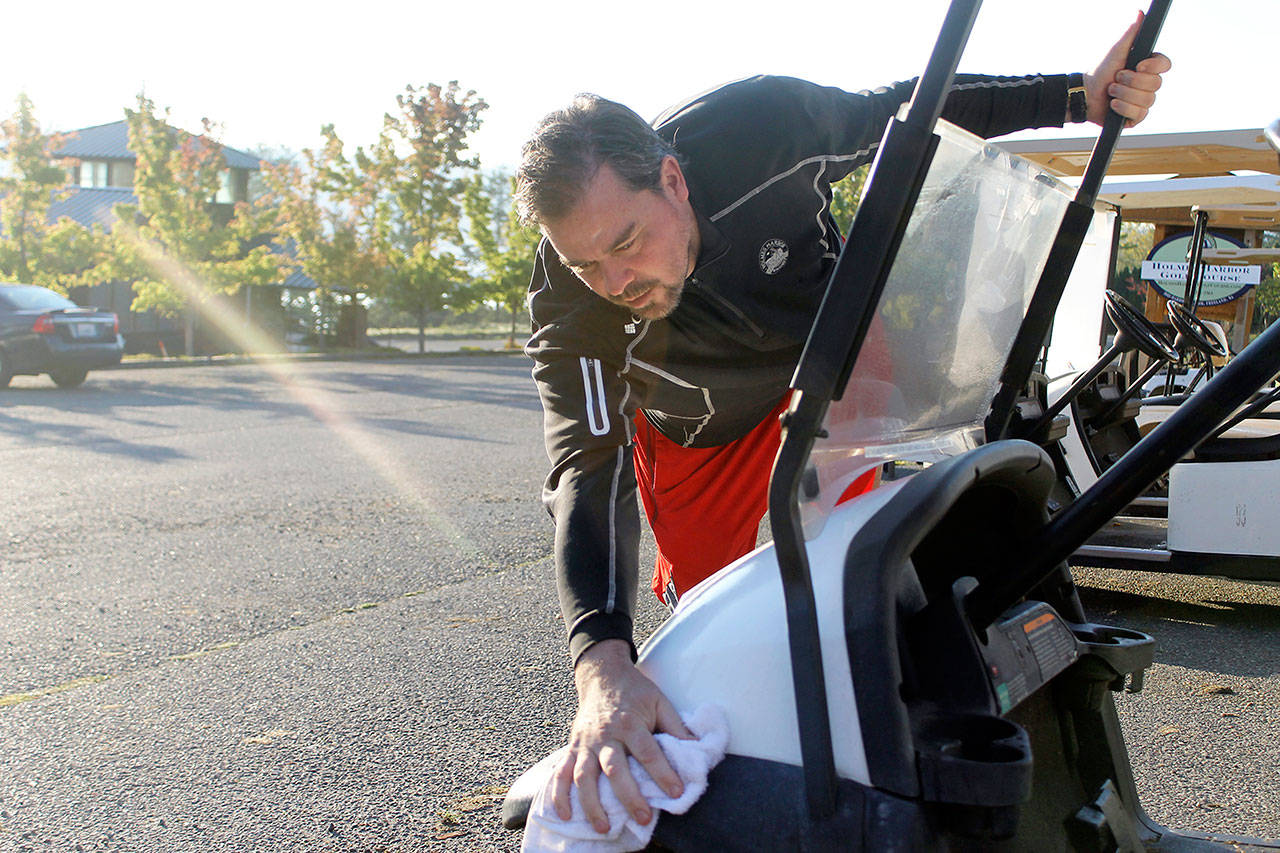A long simmering dispute that began in 2014 over parking rights at a Freeland golf course has finally been settled.
Island County Superior Court Judge Alan Hancock recently ruled in favor of the Holmes Harbor Sewer District to preserve an easement that guarantees parking at the Holmes Harbor Golf Course. It was argued by Holmes Harbor Golf, LLC, the entity that owns the parking lot and clubhouse, that the district had no legal right to park in the lot.
In an Oct. 16 summary judgment, a decision that avoids a trial, Hancock determined that the easement established in a 1993 master site plan gives the sewer district a nonexclusive right to access and use the lot.
“It’s undisputed that the parking lot is part of the property that is bounded by the site plan and is subject to the easement,” Hancock said.
The easement states the area is “for the ongoing use, operation, maintenance, and repair of the golf course, associated facilities, utilities, features and improvements. Said easement is dedicated to the benefit of the current and future owners of Holmes Harbor Golf Course.”
Hancock called the language of the easement “extremely broad” but said the primary function of the easement is to allow for maintenance and repair of the golf course facilities. He also added that all of the property within the boundary of the site plan, including nearby residential lots, is subject to the easement.
Holmes Harbor Sewer District Commissioner Jens Rivera, who is also the board’s president, said they were “very happy with the ruling.”
“It gives us some sense of security and stability going forward,” Rivera said. “Because we are always worried about a disruption to the golf operation.”
Edmonds resident Kevin Hanchett and his business partner, Mike Hooper, own Holmes Harbor Golf, LLC. Hanchett felt Hancock’s ruling was fair.
“He’s a good judge,” Hanchett said. “He has well-founded rulings.”
He confirmed they are not considering an appeal.
Hanchett and Hooper originally purchased the fairways, clubhouse and adjacent undeveloped land of the golf course in 2011. The fairways of the 18-hole course were later sold to the district in 2013, which hired an independent contractor to run and operate the golf course. The district uses the fairways to disperse treated effluent through sprinklers, making them an essential component of the sewer system. Without the ability to use the parking lot and operate a successful golf business, the cost of maintaining the fairways falls to ratepayers — an expensive proposition.
The relationships between the district and the LLC began to sour soon after the purchase in a series of incidents. In 2014, large concrete blocks were placed in the western entrance to the parking lot that restricted access for golf patrons, followed by a chain to cut off all access to the entrance. Hanchett claimed at the time that the blocks were to ensure security for a July 4 party and that he had no involvement with the chain.
Hanchett also thwarted the district’s effluent removal efforts when he alerted Island County that a pond was drained and graded without a permit, causing a halt in work.
Hancock addressed several other issues raised by Holmes Harbor Golf, LLC, from claims of an estoppel to whether the entity obtained title to all of the property within the site plan area.
Holmes Harbor Golf, LLC claimed the district lost its easement by estoppel (when a party asserts a fact that is inconsistent with a previous position) when it sought a lease for the parking lot. Hancock, however, determined it did not apply because it was a legal issue and that seeking a lease would not “necessarily be inconsistent with the sewer district’s legal position that it had an easement over the parking lot.”
Hancock also determined Holmes Harbor Golf, LLC did not obtain title because the easement applies to all of the property within the boundaries of the site plan, including property that it never owned.
“There was no merger because (Holmes Harbor Golf, LLC) never obtained title to all of the property within the site plan area,” Hancock said.
Kinnon Williams of the Bellevue-based firm Inslee Best, which represented the district, said Hancock’s rulings addressed several issues that needed resolution and clarification.
“It’s good because it resolves a lot of the things for the district that’s been hanging out there for a while,” Williams said.
Holmes Harbor Golf Course operator Paul Lavin is relieved the dispute is over.
“It’s perfect because now I can move forward and be able to possibly build a new clubhouse and use the parking lot,” Lavin said. “Before, I wasn’t sure that was a possibility. That’s a huge burden off me.”
Lavin, a Professional Golf Association pro, operates the course using a trailer as a clubhouse with carts and equipment exposed to the elements; it was all formerly housed in the main clubhouse, which Hanchett has put up for sale. Rivera said they are also exploring the possibility of a cart barn.
“Much of this will depend on financial considerations, input from the community and the ultimate future of the current restaurant/clubhouse facility,” Rivera wrote in an email.
Hanchett said he’s been looking to sell the current clubhouse that he owns as a single-family residence; it is zoned as residential. He has no plans for the parking lot.



